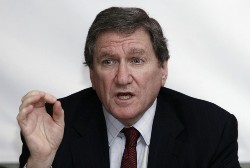US ex-diplomat warns against deferring Sudan president indictment
September 21, 2008 (WASHINGTON) – The former US envoy at the UN said that the world must allow the judicial process of the International Criminal Court (ICC) in the case Sudanese President Omer Hassan al-Bashir to proceed.

“Those advocating this step argue that it would give negotiators leverage to produce results in Darfur. Yet they have never produced evidence for this, nor defined what the benchmark for success would be at the end of the 12 months. Mr. Bashir is simply playing for time, offering nothing. Mr. Milosevic did the same. Give Mr. Bashir a year and he will take it – and ask for more” he said.
The ICC prosecutor Luis Moreno-Ocampo announced in mid-July that he requested an arrest warrant for Al-Bashir.
Ocampo filed 10 charges: three counts of genocide, five of crimes against humanity and two of murder and accused Al-Bashir of masterminding a campaign to get rid of the African tribes in Darfur; Fur, Masalit and Zaghawa.
Holbrooke who was the special envoy for the Balkans during the civil war said that when Serb officials were indicted by the Yugoslav tribunal in July 1995 for war crimes in Bosnia the same arguments were brought up on peace vs. justice.
“Less than five months later, an agreement was reached in Dayton to end the war…. What had seemed an insurmountable obstacle turned out to be an unexpected opportunity” he said.
Sudan and a number of regional organizations including the African Union (AU), Arab League, Non-Aligned Movement (NAM) and Organization of Islamic Conference (OIC) condemned Ocampo’s request and called on the UN Security Council (UNSC) resolution under Article 16 of the ICC Statute deferring Al-Bashir’s indictment.
Last week the Guardian newspaper said that France and United Kingdom are quietly backing efforts to stall Al-Bashir indictment.
But the former US diplomat warned against such a step saying it sends the wrong signal to war criminals.
“The US and the EU must resist efforts to suspend ICC prosecutions. Peace negotiations have been stalled for nearly a year for reasons unrelated to a possible warrant against Mr. Bashir. Suspension may seem a safer course to follow in the short run, but it will embolden him and other future suspected war criminals” he said.
“Bringing perpetrators of international crimes to justice is undeniably difficult when trying simultaneously to end a conflict, but it is the right choice” he added.
Holbrooke was in a center of a controversy when the Serb leader Radovan Karadzic alleged the US diplomat made a deal with him promising him that he would be immune from prosecution if he steps down from power.
However Holbrooke vehemently denied the story.
The Sudanese 2nd Vice President Ali Osman Taha is in New York to lobby world countries to support his country’s demand for a deferral.
No country in the UNSC has tabled a formal resolution which needs 9 votes with none of the permanent members using the veto power to block it.
In March 2005 the UNSC triggered the provisions under the Rome Statute and referred the Darfur case to the ICC for investigations.
(ST)

Michael Davies
Holbrooke should make his comparison with Sudan more carefully
“Less than five months later, an agreement was reached in Dayton to end the war…. What had seemed an insurmountable obstacle turned out to be an unexpected opportunity” he said.
But this very misleading. Radovan Karadzic, leader of the Bosnian Serbs, was indeed indicted in May 1995, five months before the historic Dayton agreement stopped the war. That much is true. But Karadzic was really the puppet of the real master criminal – Slobodan Milosevic, President of Serbia.
Milosevic was not indicted until 1999 and was free man when he signed the Dayton accords in 1995. I doubt somehow he would have been sitting down to negotiate a peace deal if he had just been put on the world’s most-wanted list by the international community. It is better to compare President Bashir’s position with Milosevic, not with Karadzic.
Richard Holbrooke is a big name, but he is careless in making this comparison. In any case, if he wants to pronounce on Sudan he ought visit and find out what all the political parties are saying about risks to peace, democracy and development. Instead he is rushing to a conclusion based on a dubious interpretation of his experience in the Balkans in 1995 – a completely different situation. Policy-by-analogy, in this case a flawed and over-stretched analogy, is dangerous.